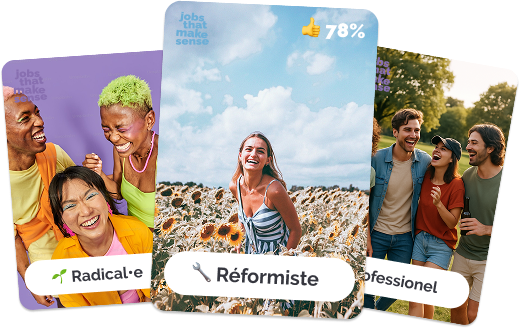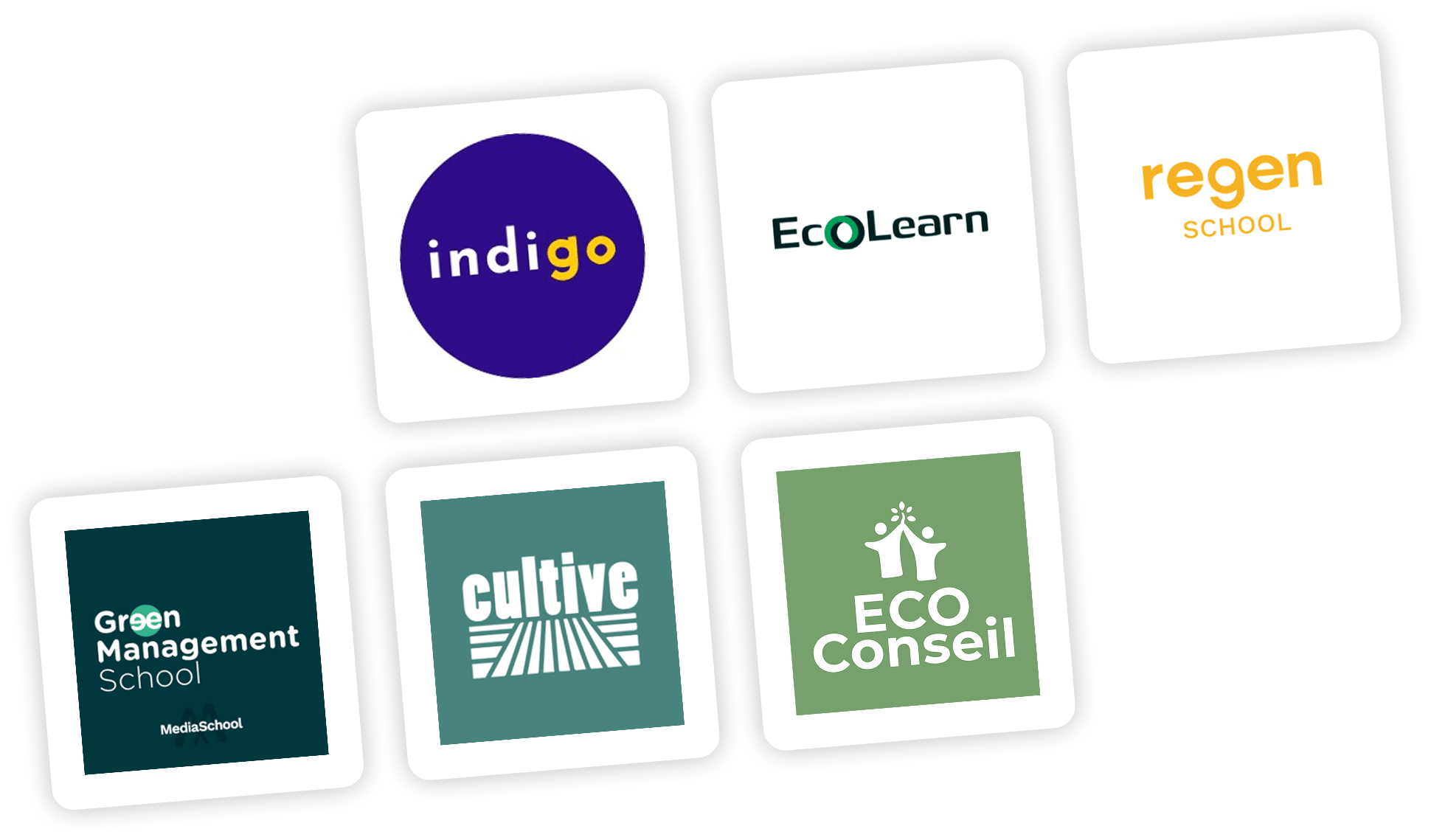Talking about ecology "without feeling judged" - The Week experience.
In 2019, Hélène Gérin and Frédéric Laloux, author of the acclaimed Reinventing Organizations, experience an ecological awakening thanks to friends who have completely adapted their lifestyles to meet this challenge. "If our friends can do it, we can do it", say Frédéric and Hélène to themselves. Like their friends before them, they set about gathering information, confronting the subject and talking about it around them. Then, sensing the interest of their friends and family during conversations, they wanted to share this experience with others. So they came up with a discussion format that would enable them to immerse themselves in the major challenges of our century, to take stock of them and their impact, with colleagues, friends, family... This was the beginning of The Week.
Jonathan, Vanessa and Paul have all been involved in one or more groups, and talk about their experiences.
An easy-to-organize experience.
The Week consists of 3 sessions of 1h30 each to be organized as a group over the course of a week. At each session, you and your group watch a 1-hour film specially shot for the experience. Each film is followed by 30 minutes of guided discussion, during which the watchword is "no judgment". Very easy to use, anyone can organize The Week, accessible on this platform. It can be done in visio, or face-to-face. "People are completely autonomous to participate in The Week, we just provide them with a tool, explains Bhadraka, manager of The Week program in France. All you need is a group to take part in the sessions, and there's no limit to the number of participants: groups of 150 people, in corporate settings in particular, can take it together. To ensure that post-film discussions run smoothly, however, sub-groups are preferred. At Artengo, the Décathlon brand for which Paul works, almost all employees have followed The Week, and they were "between 6 and 12 each time to follow the sessions" Free for individuals, it is chargeable for professionals. Finally, it is translated into several languages, as it is available in French and English, with subtitles in German, Spanish, Dutch, Swedish, Polish and soon Danish.
What kind of future do you want to leave your children?
This is what the first session of The Week is all about. Jonathan, who has been aware of transition issues for several years, was "turned around" by it. "I was telecommuting, I did The Week on video, and the only person with me at home was my daughter, on school vacations." Together to watch the film, he realizes that she won't have the same quality of life as he does today. In 20 years, she'll be his age, and her life may be punctuated by heatwaves, wars and displacements that will profoundly change her way of life. If she wants to have a child, she may not be able to, as pollution will impact her health, especially her fertility."Even though I'm aware of the situation we're in, I tend to live in the moment. The realization that it's going to happen so soon completely threw me for a loop." When the video ends and it's time to share with others, he's unable to. "I think everyone was very surprised, I experienced it in a very strong way, because of this context in which my daughter was next to me." Vanessa, also sensitized to these subjects, also says she had her "little slap" during this first session. She who had hitherto "refused to project herself 20 or 30 years into the future"is getting caught up in the game in the context of The Week. "I have three daughters. Projecting your children's ages to 2050 feels weird." Paul, sustainable development manager at Artengo, for his part made the prototype version of The Week with his work colleagues. He and his colleagues were also emotionally impacted. "When you see what the world will look like in 2050 and you have this question of children, you get a slap from space", expresses Paul, who himself has no children, but was thinking"about little Jules", his 3-year-old nephew."Climate issues, we hear about them all the time on TV, but "What will our lives look like in 2050?" Is that a question we've really asked ourselves?" he adds.
Why this logic of always more?
For the second session, held the following day, Jonathan was this time at work to follow the videoconference with his group. His job is to create and accompany in their development, startups from the world of academic research."This second session tackles our linear models, in which we're a bit trapped as individuals" he says, and inspiring alternative models. "Optimism" is the feeling Jonathan takes away from this session. Vanessa, who was eager to get back to the group after the hustle and bustle of the first session, meanwhile, experienced the second as a"landing". She questions many things, such as "Why are we stuck in a destructive system? Why can't we get moving, even though we have our eyes in the headlights?" She also appreciated the calm, composed discussions that followed, without being judgmental: "the fact of landing in a group, in confidence, even though I didn't know them, of speaking in her "I" and not making the other feel guilty, that was good". As the framework and rules are set each time, there's this assurance of not having "political or religious considerations in the discussions" she points out. For Paul, on the other hand, the second day didn't have the same resonance: "after the second day, I left with a lot of anger, I even felt like leaving Décathlon. It's a big company that operates in many countries and pollutes. I told myself that I might be just one more stone contributing to this pollution. Then I remembered why I was at Décathlon in the first place. Decathlon's aim is to make sport accessible to as many people as possible, and in addition to the environmental aspect, there's also the social aspect: making sport accessible enables people to get together and exchange ideas. Given Deacthlon's social and environmental commitments, I know I'll be able to contribute to taking action by staying with this company.'" - Paul
5 ideas for action after The Week
For the 3rd and final session, it's time for action! Jonathan, Vanessa and Paul all took initiatives, at their own level, following The Week. Here are just a few examples:
#1 Join associations.
"Beyond moocs, webinars, I'm doing a bit more concrete action now: via an association, I send lobbying emails to MPs, I've also demonstrated with Alternatiba." - Vanessa
#2 Share the The Week experience.
"My parents live in Guadeloupe and their grandchildren live in mainland France. The frequency with which they come to France is a subject of conflict between us. I try to make them understand that they are compromising the health of their grandchildren with all the carbon they send into the sky. I'm trying to get this message across, but not in the most skilful way. I wanted to give them The Week experience, which is a guilt-free approach." - Jonathan
"I did it again with friends." - Paul
#3 Changing everyday habits.
"In The Week, they insist on doing without things that don't weigh us down on a daily basis. Following The Week, for example, I reduced my meat consumption. I'm not a vegetarian, but I've cut back, and it wasn't a superhuman effort for me to do that." I also cycle to the office when I can. It hasn't changed my daily routine, I take just as much time in the car and it gives me fresh air in the morning, I even arrive more awake at the office." - Paul
"It may sound anecdotal, but I had a composter lying dormant in my garage and decided to take it out, assemble it and fill it. I'm glad I did, because I had no reason to put it off. What's more, it's satisfying to see one's garbage can going down and back up to do something more useful." - Vanessa
#4 Don't just say. Do.
For Vanessa,"proof by example is always good advice. By getting started, others will follow." To illustrate this, she uses the example of Dancing Guy, whom we love at makesense! For her, The Week can make this movement possible, "by being an individual actor.ice, we can multiply the people who mobilize."
#5 Retraining in a high-impact profession
Changing one's working practices, or even changing one's profession, are also possible ways of getting involved in the ecological and social transition. Among the 3 interviewees, Vanessa, previously a brand design development manager, had made a career change to focus on the transition before The Week experience. Today, she carries out consulting and business development assignments on sustainable transition issues for organizations. It was through her new job that she discovered the initiative. She recounts:"In 2019, when the Pacte law came in, I asked myself the question of the role of companies for transition in our society. It planted its little seed, which ripened in 2020, when I did a skills assessment, and until the end of 2021, when I left my company to retrain and support the sustainable transition of organizations. I did a training course with Ecolearn on the fundamentals of sustainable enterprise and another with Lumia on changing organizational and civilizational models. For the past 2 years, I've also been involved on a voluntary basis, becoming host of the Fresque du Climat and host of the Match of the Century with Ticket for Change. I built my transition on this mix of theoretical input and practical experience. I've also done a few freelance assignments working on CSR labeling for companies and regenerative economy models. Most recently, I spent 5 months at makesense, where I was in charge of partnerships linked to the transition of organizations. That's where I heard about The Week." Having decided to make a professional commitment to transition, Vanessa plans to use The Week regularly, the approach being powerful and complementary to the training she has already taken.
A final word on The Week?
"Following The Week has given me a lot of distance from my personal worries, which are ultimately unimportant in the face of these issues."
Jonathan
"What struck me was the diversity of the characters: young, old, in the city, in the country... You can identify with any of them. Then, when Hélène and Frédéric speak to you, they're at home. A real cocoon is created despite the brutality of the information you receive. "
Vanessa
"Doing it face-to-face has its advantages. As we're all working together in the same place, exchanging ideas at lunchtime and after the sessions helped a lot. For example, many of them came to see me at the end of the first day to share their emotions."
Paul
How do I go about organizing a session?
The heart of the experience is to have this conversation with your loved ones. This requires:
#1 Find people to do it with: at least 4 or 5 people.
#2 Find 3 dates: 3 times 1h30 ideally over a week, in the evenings or during lunch break;
#3 Go to the website to register your group. The schedule for the first session and the film are then available on the page;
#4 Once you've completed Day 1, simply repeat the process, continuing with Day 2...
Tools required: if The Week is followed in person, you'll need a computer or TV to launch the film. If you're watching it online, you'll need to enable screen sharing;
💡 Bhadraka's advice: leave a minimum of one night and a maximum of 3 days between each session! The experiment doesn't work well if you do several sessions in the same day.
What next?
You can easily organize a next session ICI.
Further information
👉 Springtime for the planet, 1000 ideas to get moving
👉 Collectives, a weapon of mass destruction?
👉Take time out to rethink your impact at work
👉 The guide to conversion to impact
Taking action
👉 You can take your first steps as a volunteer with Re_action
👉 If, like Vanessa, you'd like to make a career change by starting with a skills assessment, here are our partner assessment organizations.



